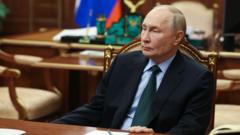In a notable development, President Vladimir Putin has endorsed alterations to Russia’s nuclear doctrine, formalizing new circumstances under which the nation could engage its nuclear capabilities. The changes, which were first suggested in September and approved by Putin on the 1,000th day of the conflict in Ukraine, delineate that an attack from a non-nuclear nation, if supported by a nuclear nation, would be perceived as a joint attack on Russia.
Significantly, the revised doctrine indicates that a major conventional assault on Russia using missiles, drones, or aircraft could justify a nuclear retaliation. Furthermore, any aggression towards Belarus or what Russia considers a critical threat to its sovereignty could also trigger a nuclear response. The Kremlin highlights that even actions by a coalition of nations perceivable as hostile could provoke a nuclear threat, thereby broadening the range of parties and military scenarios potentially subject to this severe consequence.
Russian officials, including Foreign Minister Sergey Lavrov, assert that they desire to avoid nuclear conflict, despite Putin's previous nuclear threats being labeled as "nuclear sabre-rattling" by Ukrainian officials seeking to elicit increased support from allies. Lavrov, speaking at a recent press conference during the G20 summit, emphasized a collective ambition within the group aimed at a world devoid of nuclear arms.
In presenting the revised doctrine, Kremlin spokesperson Dmitry Peskov stressed the importance of the document, urging international actors to analyze its implications in depth. The timing of this update coincides with a US decision to permit Ukraine to utilize advanced long-range missiles, prompting Russia to warn of "appropriate and tangible" retaliatory measures. Peskov described the publication of the new doctrine as timely, reflecting a necessary alignment with the realities of the ongoing geopolitical landscape.
As Ukraine commemorates the somber milestone of 1,000 days since the onset of the war, ambitions for continued military support from Western allies remain steadfast, despite apprehensions about the potential for rising nuclear tensions.
Significantly, the revised doctrine indicates that a major conventional assault on Russia using missiles, drones, or aircraft could justify a nuclear retaliation. Furthermore, any aggression towards Belarus or what Russia considers a critical threat to its sovereignty could also trigger a nuclear response. The Kremlin highlights that even actions by a coalition of nations perceivable as hostile could provoke a nuclear threat, thereby broadening the range of parties and military scenarios potentially subject to this severe consequence.
Russian officials, including Foreign Minister Sergey Lavrov, assert that they desire to avoid nuclear conflict, despite Putin's previous nuclear threats being labeled as "nuclear sabre-rattling" by Ukrainian officials seeking to elicit increased support from allies. Lavrov, speaking at a recent press conference during the G20 summit, emphasized a collective ambition within the group aimed at a world devoid of nuclear arms.
In presenting the revised doctrine, Kremlin spokesperson Dmitry Peskov stressed the importance of the document, urging international actors to analyze its implications in depth. The timing of this update coincides with a US decision to permit Ukraine to utilize advanced long-range missiles, prompting Russia to warn of "appropriate and tangible" retaliatory measures. Peskov described the publication of the new doctrine as timely, reflecting a necessary alignment with the realities of the ongoing geopolitical landscape.
As Ukraine commemorates the somber milestone of 1,000 days since the onset of the war, ambitions for continued military support from Western allies remain steadfast, despite apprehensions about the potential for rising nuclear tensions.



















